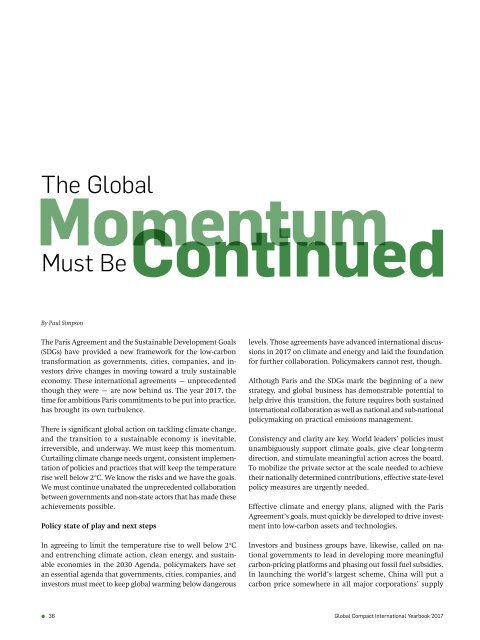Global Compact International Yearbook 2017
Sustainability in Troubled Times We life in times of uncertainty and global (dis)Order. „Understanding global mega-trends is crucial. We live in times of multiple, evolving and mutually-reinforcing shifts“, says UN Secretary-General António Guterres. He adds: „These dynamics, of geopolitical, demographic, climatic, technological, social and economic nature, enhance threats and opportunities on an unprecedented scale.“ Therefore sustainability in troubled times is the key topic of the Global Compact International Yearbook 2017, edited by macondo publishing.
Sustainability in Troubled Times
We life in times of uncertainty and global (dis)Order. „Understanding global mega-trends is crucial. We live in times of multiple, evolving and mutually-reinforcing shifts“, says UN Secretary-General António Guterres. He adds: „These dynamics, of geopolitical, demographic, climatic, technological, social and economic nature, enhance threats and opportunities on an unprecedented scale.“ Therefore
sustainability in troubled times is the key topic of the Global Compact International Yearbook 2017, edited by macondo publishing.
You also want an ePaper? Increase the reach of your titles
YUMPU automatically turns print PDFs into web optimized ePapers that Google loves.
The <strong>Global</strong><br />
Momentum<br />
BeContinued<br />
Must<br />
By Paul Simpson<br />
The Paris Agreement and the Sustainable Development Goals<br />
(SDGs) have provided a new framework for the low-carbon<br />
transformation as governments, cities, companies, and investors<br />
drive changes in moving toward a truly sustainable<br />
economy. These international agreements – unprecedented<br />
though they were – are now behind us. The year <strong>2017</strong>, the<br />
time for ambitious Paris commitments to be put into practice,<br />
has brought its own turbulence.<br />
There is significant global action on tackling climate change,<br />
and the transition to a sustainable economy is inevitable,<br />
irreversible, and underway. We must keep this momentum.<br />
Curtailing climate change needs urgent, consistent implementation<br />
of policies and practices that will keep the temperature<br />
rise well below 2°C. We know the risks and we have the goals.<br />
We must continue unabated the unprecedented collaboration<br />
between governments and non-state actors that has made these<br />
achievements possible.<br />
Policy state of play and next steps<br />
In agreeing to limit the temperature rise to well below 2°C<br />
and entrenching climate action, clean energy, and sustainable<br />
economies in the 2030 Agenda, policymakers have set<br />
an essential agenda that governments, cities, companies, and<br />
investors must meet to keep global warming below dangerous<br />
levels. Those agreements have advanced international discussions<br />
in <strong>2017</strong> on climate and energy and laid the foundation<br />
for further collaboration. Policymakers cannot rest, though.<br />
Although Paris and the SDGs mark the beginning of a new<br />
strategy, and global business has demonstrable potential to<br />
help drive this transition, the future requires both sustained<br />
international collaboration as well as national and sub-national<br />
policymaking on practical emissions management.<br />
Consistency and clarity are key. World leaders’ policies must<br />
unambiguously support climate goals, give clear long-term<br />
direction, and stimulate meaningful action across the board.<br />
To mobilize the private sector at the scale needed to achieve<br />
their nationally determined contributions, effective state-level<br />
policy measures are urgently needed.<br />
Effective climate and energy plans, aligned with the Paris<br />
Agreement’s goals, must quickly be developed to drive investment<br />
into low-carbon assets and technologies.<br />
Investors and business groups have, likewise, called on national<br />
governments to lead in developing more meaningful<br />
carbon-pricing platforms and phasing out fossil fuel subsidies.<br />
In launching the world’s largest scheme, China will put a<br />
carbon price somewhere in all major corporations’ supply<br />
36<br />
<strong>Global</strong> <strong>Compact</strong> <strong>International</strong> <strong>Yearbook</strong> <strong>2017</strong>

















